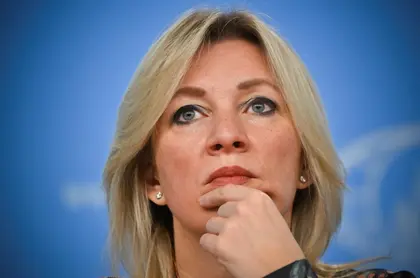Russia believes a lasting peace with Ukraine can only happen if the West stops sending arms and if Kyiv accepts "new territorial realities", Russia's foreign ministry told AFP.
Ministry spokeswoman Maria Zakharova said in an interview that Moscow was open to negotiations but added: "At the moment, we do not see the political will for peace either in Kyiv or in the West".
JOIN US ON TELEGRAM
Follow our coverage of the war on the @Kyivpost_official.
She also said that, for any deal to happen, Ukraine should have neutral status and the rights of Russian-speaking residents should be protected.
"We will not allow the existence on our borders of an aggressive Nazi state from whose territory there is a danger for Russia and its neighbours," she said.
Russia has for years tried to paint the pro-Western Ukrainian government led by President Volodymyr Zelensky -- who is Jewish -- as neo-Nazi and used this as a pretext for its offensive in Ukraine.
Zakharova also dismissed the "peace formula" proposed by Zelensky which includes a stipulation that Russian troops must leave all of Ukraine.
She said Kyiv's proposal put forward last year "has nothing to do with peace and is an array of ultimatums for Russia to justify continued military action".
- Ukraine wants Russian 'capitulation' -
Zakharova accused Kyiv of not wanting to "take into account current realities and... pursuing a completely different aim -- the capitulation of our country with the help of the West".
"Of course, based on these conditions, we will not speak with anyone from the Ukraine leadership," she added.

ISW Russian Offensive Campaign Assessment, December 26, 2024
Zakharova added however that Moscow could restore a grain deal that allowed Ukraine to export grain through the Black Sea, but only if Western sanctions on Russian agriculture companies were lifted.
"The possibility of reviving the Black Sea initiative remains," she said in a series of written answers to questions.
Russian President Vladimir Putin ordered troops into Ukraine in 2022, triggering unprecedented Western sanctions that have largely isolated Russia from the West.
Zakharova said that those sanctions had "boomeranged" on the West and had instead had the effect of "confirming the Russian state's international authority".
Moscow has since redirected much of its vital oil and gas exports to China and India, and imposed currency controls to prop up its volatile currency, the ruble.
- Western sanctions 'boomeranged' -
The Russian economy shrank in 2022, but started to grow again in the second quarter of this year despite rising inflation rates.
"The collective West's illegal restrictions have not diminished Russia's geopolitical influence," Zakharova said.
On the first anniversary of the conflict this year, the United Nations General Assembly adopted a resolution calling for a full Russian withdrawal from Ukraine.
The resolution was backed by 141 member states, with 32 countries including China and India abstaining, and seven countries including North Korea voting against.
But Zakharova pointed out that a large majority -- 80 percent -- of the world's population lived in countries that have not adopted any sanctions against Russia.
Instead, she said Moscow's ties with many countries in Asia, Africa, the Middle East and Latin America are developing "steadily" despite "desperate" efforts by the West to turn them against Russia.
She said new systems for interbank relations, international settlements and trade routes not tied to the West were "being actively developed and set up".
In Asia, she said China was "a like-minded partner" with whom Russia was pursuing ties based on "comprehensive partnership and strategic co-operation".
She said Russia was also strengthening relations with North Korea and accused the US of "pursuing a path of escalation of tensions on the Korean peninsula by increasing miliary activity".
"This US course is dangerous and fraught with serious consequences," she said.
During a visit to Seoul in November, US Secretary of State Antony Blinken warned that military ties between North Korea and Russia are "growing and dangerous", and urged China to restrain Pyongyang.
Zakharova said Russia would support any country with a foreign policy not aligned with the West, offering "honest and good-faith co-operation not based on diktat".
You can also highlight the text and press Ctrl + Enter






